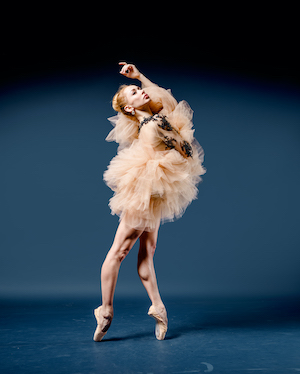Artistic Director and Founder of dance/theatre company Lost Dog Ben Duke talks Shakespearean romance, Rambert and dancing alone with Ruth Mattock.
If Ben Duke were to offer you a business card, what would it say? The product of dance, literature and drama lines, he’s an artistic cocktail that eludes definition.
My first encounter with Duke was in his one-man show Paradise Lost (lies unopened beside me). If I were to tell you that Milton’s centuries-old epic poem on the fall of man from grace could be conveyed by a skinny chap in a nude bodystocking and artfully-sewn fig leaf under a rain of chickpeas, you might have your doubts. And yet, in a wry, absurd and colloquial style, so the depths of tragedy were plumbed.
After a number of directorial roles including with Rambert and Barely Methodical Troupe, on which more later, Duke is back on stage as one half of the star-crossed pair in Juliet and Romeo. Characteristically unflustered by the immensity of the myth, this Lost Dog project follows the Veronian lovers in a life where the death scene was only almost, and they were allowed to live on into marriage. What happens when, twenty-five years on, the world’s most passionate lovers experience middle age, haunted by their extraordinary teenage selves? This is romance that dashed off in a carriage and got stuck behind a tractor. But drawing the profound out of a recognisable everyday is what Duke does best.
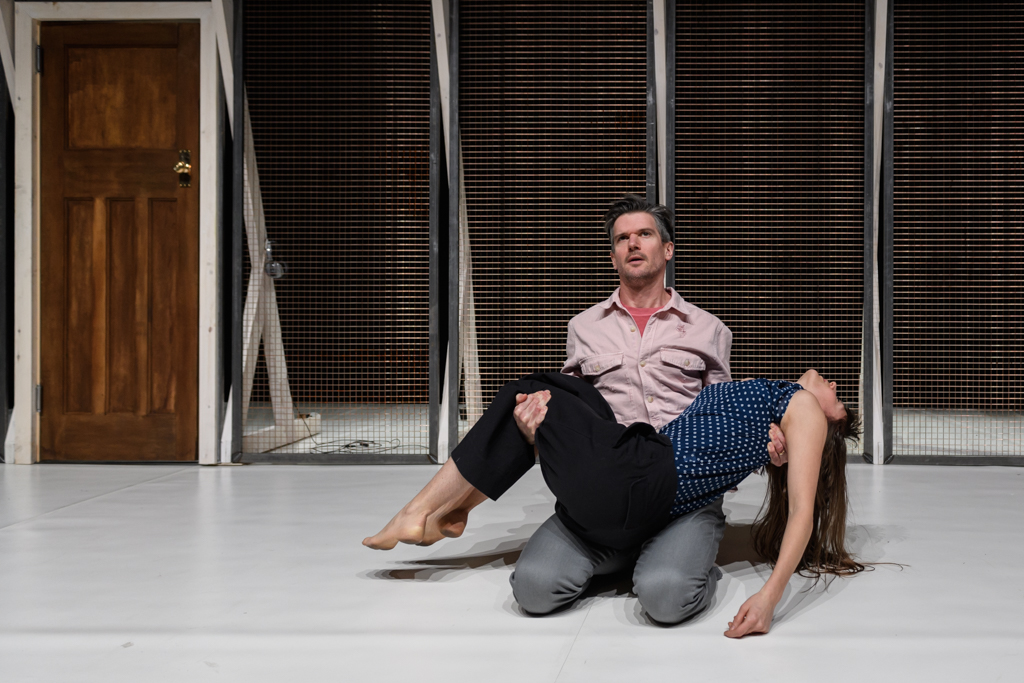
Photograph © Jane Hobson.
He is a man of his own words, including a few penned for the Guardian. I wonder, then, how he feels about being interviewed? He laughs, ‘I feel fine about doing an interview. Obviously, it’s easier just to kind of ramble on, form free and then it’s your job to transform it into something coherent.’ The collage I’m to create is a good analogy for the creation of Ben Duke as we know him today, emerging from an array or artistic training that could have lead in a hundred directions. Having taken a literature degree at Newcastle University, studied at Guildford school of Acting and finished up with the London School of Contemporary Dance, he has built all three strands into a coherent whole. But it wasn’t always so clear. ‘I was performing at university; I thought I wanted to be an actor, but found it was too cerebral and I’d had enough of these words. I started watching more and more dance and I felt like actually this is what should be on stage, this non-naturalistic, heightened physical language. And then when I entered into that physical training, which I loved, I then felt, it’s amazingly quiet here, why don’t we talk on stage? And that troubled me.’
Although many Lost Dog productions had gone before it, the Paradise Lost show was a kind of marker: ‘There was a coming together of all those elements that I’d been struggling with or kind of ping-ponging between up until that point.’ And it was the fruit of more than Duke’s own ambition. He points out that Milton had wanted Paradise Lost to be performed. ‘Ever since I read [Milton’s Paradise Lost], I was obsessed with the idea of staging it in some way and would often think about that. Initially I wanted to do a huge extravaganza, I imagined millions of pounds being spent on it, this massive production.’ But economy of means are instead the show’s signature, and we can only be grateful it came out as it did.
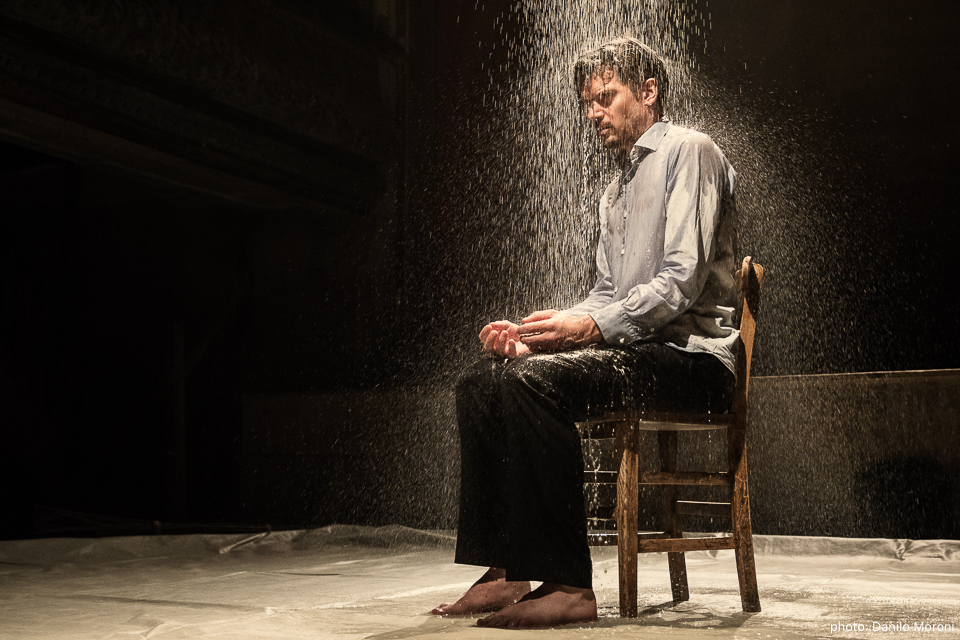
While Paradise Lost holds a special place in Duke’s heart, ‘Romeo and Juliet is different, I love the play but a lot of my interest in that was to do with my feelings around the ending and this desire for a different one. There was more of a sense of needing to rewrite my adolescent frustration that they had to die at the end of that.’
Not one to shy away from a literary beast, he revels in the storyteller’s freedom: ‘I love the fact that [those stories] are public property now. Milton rewrote the Genesis story and Shakespeare rewrote the version that he had, there’s this rewriting that for some reason I feel drawn to. I can rely on the fact that people know this story and therefore we are free to fragment it or chop it around and change bits of it.’
You can’t help suspecting Duke has a Puckish sense of joy in puncturing the pretensions of high art while simultaneously paying homage. Milton believed his poetry was inspired direct from God – it is perhaps apt then that the million-pound extravaganza gave way to Duke’s self-deprecating one man show. But Duke’s puncturing needle is directed towards himself too – it was, after all, him in the bodystocking under the chickpeas. ‘I did open [the book] at sections and go, ‘ah no, I can’t’ and shut it again. I found myself retreating constantly from [Milton’s] brilliance. It did mock me a bit, the book sat there and I became increasingly nervous to open it. But its presence was very important in the studio. And in the piece I carried the book around with me as something that I’m referring to and dependent on.’
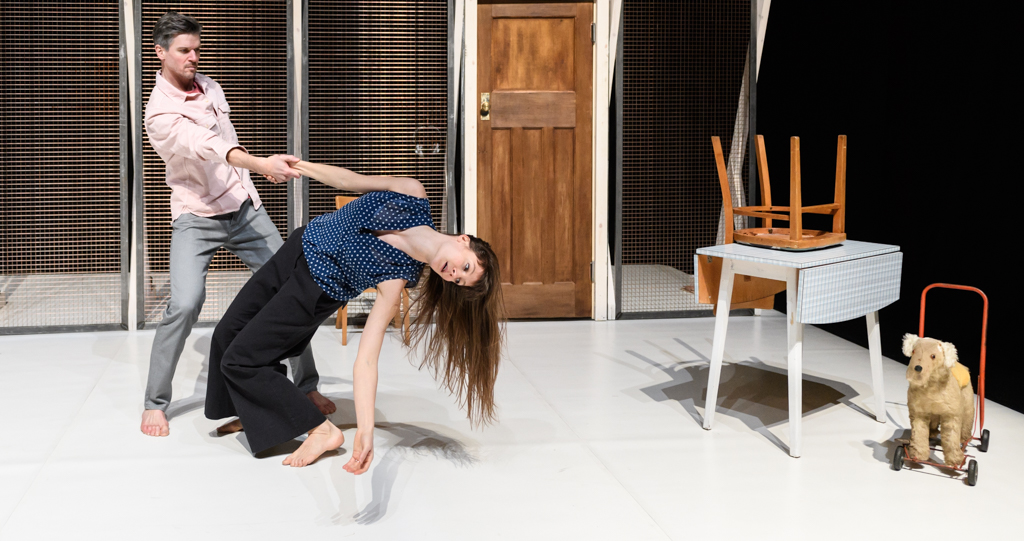
In preparation for Juliet and Romeo, Duke and co-star Solene Weinachter absorbed the many versions, including Baz Luhrmann’s film and Kenneth Macmillan’s classic ballet (the one with the iconic death-dance between Romeo and Juliet’s corpse). But they also brought reality in. ‘There’s a lot of sitting around talking I guess. Getting into this thought experiment, what if, where did they go, what would have happened in the few days after that moment? And then there was a lot of talking about the nature of relationships.’ The tour has taken them from the Blackpool Grand to village halls, before landing at the Royal Ballet’s new Linbury Theatre in April. Above on the Covent Garden stage will be that very Macmillan production. ‘It’s a place to comment on these grand narratives and high art. I’ve always felt like a bit of an outsider in terms of my role inside the dance world, so to find ourselves performing inside one of the homes of classical dance is fun.’
Another dance home Duke has already penetrated is Rambert. In 2017 he created ‘Goat’ with the contemporary company, a musing on performance inspired by the music of Nina Simone and nominated for an Olivier. It was not a smooth ride, however. In his diary for the Guardian, Duke wrote, ‘I asked the company one at a time to say why they shouldn’t be sacrificed and who should be. They almost unanimously chose to sacrifice me. I think they are trying to tell me something.’ He had come from working almost alone on Paradise Lost, to choreographing a crowd. ‘It was a difficult process and I think the company would agree with that; the way I work being different to the way lots of them were used to working, or the majority of their processes being different to the way I work. I was by myself needing silence quite a lot of the time in the studio, or just moments to contemplate. That can be a bit odd when people are waiting for some kind of introduction and I’m sitting there in silence. I try and say that I need silence and it’s not a display of disappointment, it’s just a moment to reflect and work out what to do next.’ Difference, however, proved a positive force in the end, and Duke is warm in Rambert’s praise. ‘I feel very good and comfortable and trusting of the company and look forward to seeing them do that piece again.’
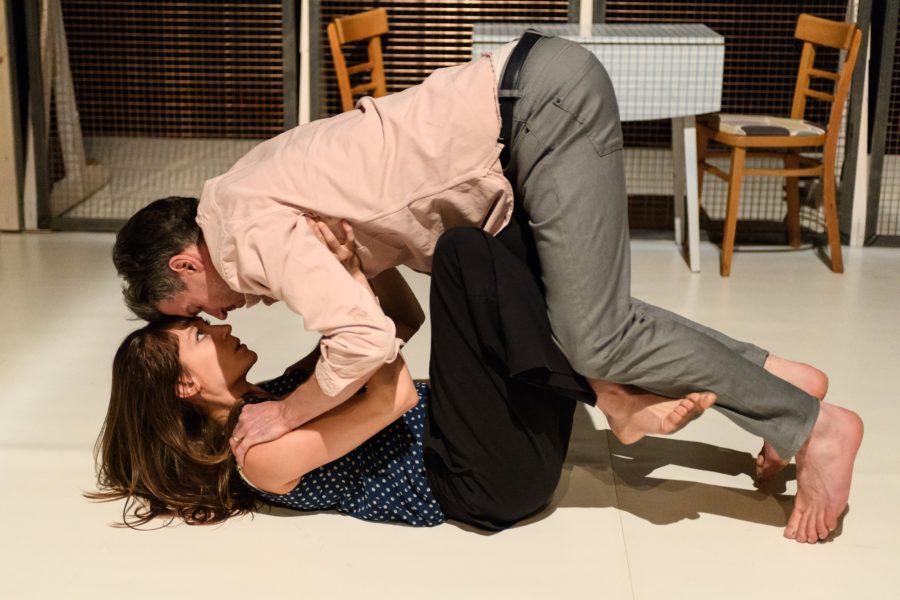
I wonder if Barely Methodical Troupe, the circus troupe with whom Duke produced KIN in 2016, represented a similar challenge. ‘I was trying to introduce the idea of narrative and character to what they were doing, and there was something of a conflict there because, particularly with the difficult tricks, they’ve got to really focus on that, and they can’t be pretending to be other things.’ I remember a moment in the show when Louis Gift landed an especially death-defying jump and slipped out of character to punch the air. ‘That see-saw is incredibly dangerous, you’re watching someone in real time succeed, and sometimes it didn’t work and you’re watching failure. It’s so dangerous it kind of cuts through any other stuff you’re trying to put on stage.’
Working alone can have its own pitfalls. ‘Sometimes I think of an idea and literally by the time I’ve stood up I’ve decided it’s a bad idea. That’s not great. But I felt with [Paradise Lost] that when there are other people in the room then ideas can be shot down quite quickly, they feel fragile. If an idea is beginning and you suggest it to someone or you show it to someone… even if they don’t say it’s a terrible idea, they pull a funny face or they pause a second before commenting on it, that self-judgement thing comes in very quickly.’
The trouble with collage is there’s no linearity. Who knows what Lost Dog will come up with next? Whatever it is, we’ll be watching.


